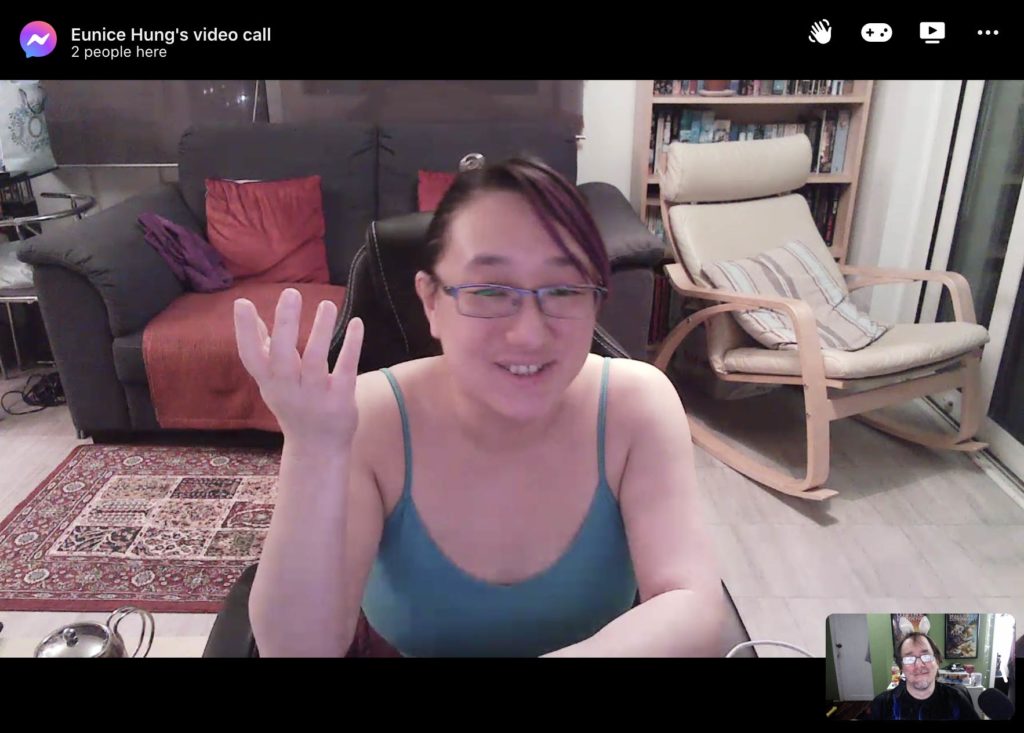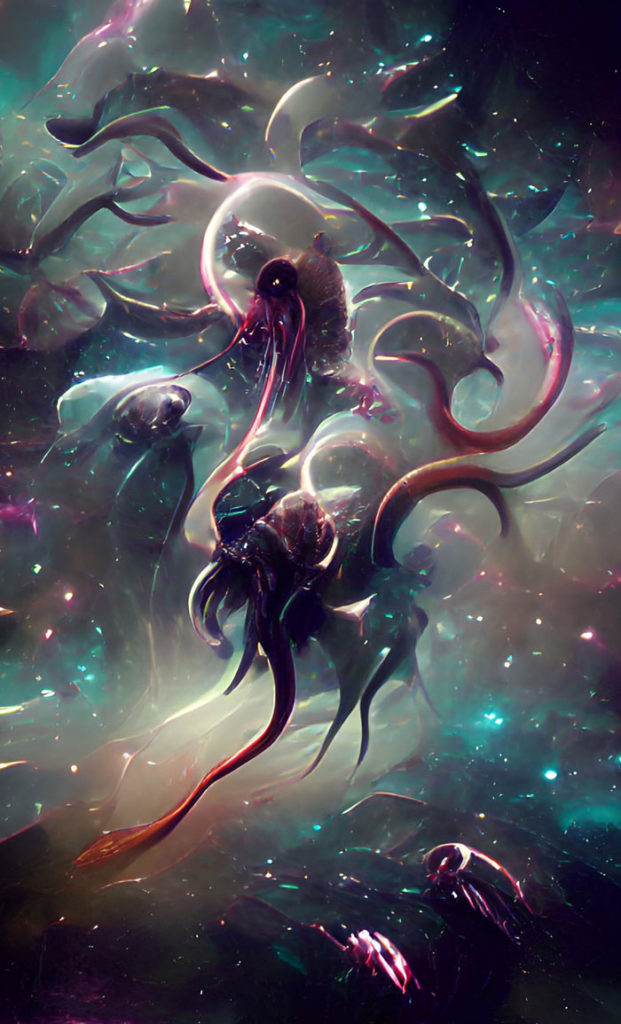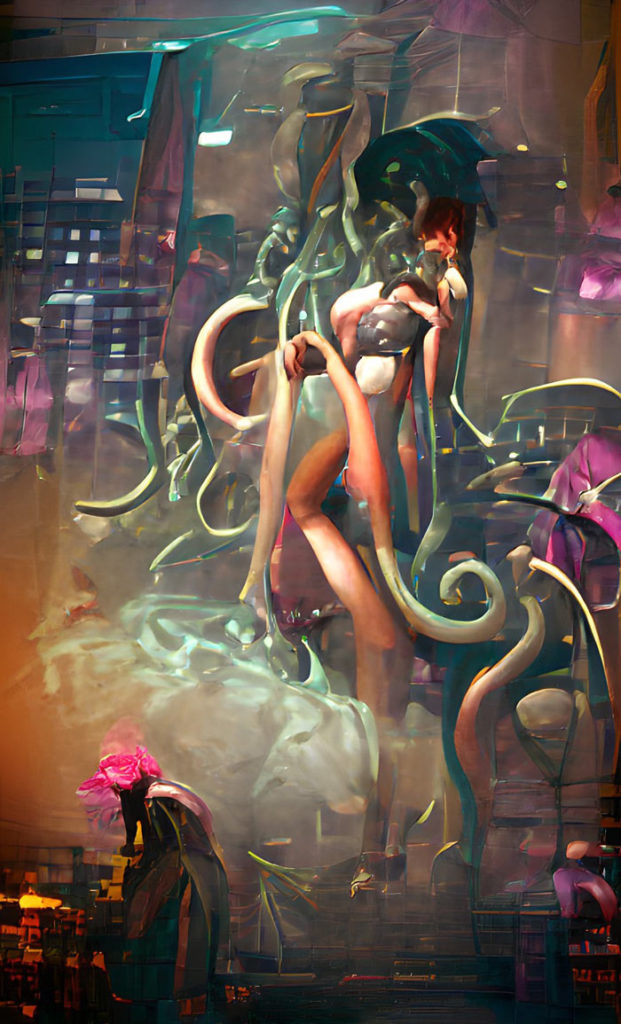
Image: Nong V on Unsplash
A few hours ago, we finished a new novella in the Passionate Pantheon universe. When we set out to write, we had an idea of the story we wanted to tell, which we expected to be somewhere between 3,500 words and 3,700 words long.
The first draft of the novella weighs in at 40,133 words.
It’s safe to say we overshot the mark a bit…and 40,133 words is after we deleted 3,039 words of sex that we felt didn’t add to the plot or the world. In other words, the deleted sex scenes alone are nearly as long as the entire story we’d planned to tell. (If you’re very good, we might share those snippets with you!)
So what happened?
When we wrote Divine Burdens, we introduced a character named Ortin, who we describe in a single sentence as having a scar. People in the City can sculpt their bodies however they want (subject only to the constraints of physics and biology), and any injury that doesn’t instantaneously kill you outright can be fixed without fuss by spending the evening in a medical pod, so scars are very rare, bordering on non-existent. Divine Burdens doesn’t explain why Ortin has a scar, but we, the authors, know how he got it and why he keeps it. As we’ve talked about before, we know our characters very well, and we’ve had hours-long conversations that become a sentence or two in one of the books.
So we set out to tell the story of how Ortin got his scar. As it turns out, sometimes the story you want to tell isn’t the story that wants to be told. We discovered whilst writing a short story about Ortin’s scar that the interesting part of the story, the most significant to him as a character, isn’t how he got it, or even why he kept it, but rather what that says about him, the impact those events had on him, and his relationship with the people around him. (Spoiler: It’s a lot. He only appears for a few paragraphs in Divine Burdens, but he’s a complex character and his relationships are even more complex.)
As writers, we have quite different ways of approaching the blank page. Eunice is what George RR Martin calls an “architect” and some other writers call a “planner”—she sits down and constructs the world of the story, building each part of it before the first word is written. Franklin is what GRRM calls a “gardener” and other folks call a “pantser”—he creates some characters, sets them loose in the world, and sees what happens. It’s the difference between planned writing vs discovery writing, a “let’s decide what happens” approach vs a “let’s see what happens” approach to the empty word processing file.
You might think this clash of styles would make writing together hard. We have nearly diametrically opposed ways to think about the mechanics of storytelling! Yet, paradoxically, that might be precisely what lets us write together so well.
Eunice builds the world and setting of the Passionate Pantheon with meticulous care. She’s drawn sketches of the City, spent countless hours working out the mechanics of the rituals in the various temples, even devised the hierarchies of the priests and priestesses and how their social interactions work.
Franklin drops characters into this crafted environment and lets them loose, then watches to see what they’ll do. It’s a process of discovery: What happens when this character appears in this world? Given these goals, desires, and motivations, what will the character do?
The stories we write together are constructed both top-down and bottom-up. We both put a huge amount of care into the world—we know how the language spoken in the City evolved (even though we don’t know it ourselves—neither of us are conlangers!), how the first colonists arrived on the planet (technically, they’re second generation colonists, but that’s a story for another day), how the generators that feed the voracious energy needs of the City work (those on-demand molecular assemblers require prodigious amounts of energy!), even how the Blessings do their magic in the brains of the folks who use them. None of these details are part of the novels, because the stories we want to tell are, ultimately, about people, not technology. But we know. We need to know, for consistency.
That rich, detailed world lets us set characters free. The fact that we know so much about the world means we aren’t trying to create both the world and the characters at the same time. That gives us the freedom to explore what Terry Pratchett calls “L-Space,” that abstract space where every potential story exists. And every so often, we discover that the story we think we want to tell…isn’t actually the story that needs to be told. The characters tell us who they are, and we find the parts of their story that make up a book.
We don’t write the way most co-authors write. Every set of co-authors has their own style of working together, of course, but frequently what you’ll see is something like what Neil Gaiman and Terry Pratchett did in Good Omens: they’ll lay out the plot, and then each go off and write a chapter, then come together to merge the bits into a whole. Of course, in order to do this, you need to figure out your plot first. This is, we suspect, part of why pantsers are typically less likely to co-author—it must be very frustrating to co-author if your writing partner comes back a week later saying “I know you’re already writing the next chapter, but it turns out this chapter I’ve just written actually totally changes the way the plot works because the characters disagreed with what we’d decided to do.” Or, alternatively, “I know you do discovery writing, but you need to write what we agreed, no matter what the characters are trying to tell you, because we already decided the plot.”
For us, this really isn’t an issue. We will often write in the same file at the same time (right now, as we work on this essay, Franklin’s cursor is seven lines away from Eunice’s cursor in the Google doc where we’re composing this!), but generally speaking, the world, the gods, and the social structures are Eunice, the characters are Franklin. The plots are some hybrid mashup of us both. We start with a high-level, bird’s-eye overview of the story as we want to tell it, decide who our characters are, and then place them in the world. And occasionally, they make choices that surprise us.
We live on opposite sides of the globe, but the miracle of videoconferencing and Google Docs means that matters not at all; functionally, when we write, we might as well be in the same room together. (It helps that Eunice is a real nightowl, given that London is an inconvenient eight hours ahead of Portland.)

A key ingredient to the way we work together is trust. Not just trust that we have similar ideas about what the world looks like and how it works, though that’s part of it. (We do have remarkably similar ways of viewing the stories, to the point where we consistently bring up a point that the other person was just about to mention.) The major factor, however, is trust that if one of us comes up with an idea and the other says “no, I don’t think that really works,” that’s okay. Our first instinct is always to say “Ok, let’s change that,” and ask questions after, not “you need to persuade me before I agree to change anything.” That small difference, that level of trust, makes a huge difference to the feeling of safety we built together and the confidence you need to be able to co-write.
We also trust our characters. They will do things that surprise us. They will let us know what story they want to tell. The stories don’t always end up the way we planned them…which is precisely why it’s so important that we both understand the world and the society so well. The world is a living thing, and the characters have as much freedom of action in that world as real people have in the real world.
We’ve had a character in The Hallowed Covenant break up with a long-term partner. That wasn’t part of the plan, and it took us both by surprise, but then when we looked back and saw the trajectory those characters were on, we both realized that, actually, it was inevitable. But we didn’t plan for it to happen; the characters told us it happened.
That’s part of the magic of creating in this world. The characters feel vivid and real, independent of each of us. They all have stories to tell. We have a list (in Google Docs, of course) of minor characters from the novels whose lives we want to return to, whose stories we want to learn more about. The backstory of Arjeniza, a very minor character in the upcoming novel Unyielding Devotion, is complex, poignant, and a bit heartbreaking. She damaged herself in the pursuit of service to her chosen god many years before the events in Unyielding Devotion, and that informs her interaction with the protagonist in a subtle way that isn’t at all obvious in the novel.
It’s a good story, and one we want to tell. Or perhaps, one she wants us to tell.
Conversely, there’s another character in the same book, Jakalva, who has such an impact on the book that Eunice compared her to a stone tossed into a still pond: the book is about the ripples. The entire novel is, in a sense, her story, even though she barely appears in it. The novel explores how she affects the lives of the protagonists, even the ones she scarcely crosses paths with. She is old, enigmatic, powerful, and has a very, very interesting history. We would love to write her story…but she won’t let us. We tentatively tried exploring her, but she is so private that she practically skywrote Do Not Touch across our attempts, and we have to accept that. She just doesn’t want anyone to know her.
The novels changed as we wrote them—structurally, narratively, thematically. The first two novels, The Brazen Altar and Divine Burdens, are structurally simple: we’re presenting an entirely new world, after all, and there’s only so much we can show of that world without overloading the reader. They work to establish a foundation, and set the “tick tock” pattern of Utopian-themed and dark-themed stories.
The third book, due out later this year, builds on that foundation; it’s both structurally and narratively more complex, with much more intricate relationships and characters. The fourth novel, Unyielding Devotion, is even more complex still…and the most important character in the novel, the one who shapes the decisions of all the protagonists, is barely present in it. It’s also the first Passionate Pantheon novel with a nonlinear timeline.
We knew the first two books would likely be the most straightforward, but we didn’t explicitly set out to write a nonlinear story with Unyielding Devotion or to write a novel in The Hallowed Covenant about seven friends whose lives intersect in ways that sends all of them off on a different trajectory. We created a high-level overview of the landscape, and then let the river flow through it, establishing its own twists and turns as it did.
Funny thing about rivers: the landscape may shape the way the water flows, but the water also reshapes the landscape.
We have had to make peace with the idea that there will always be more stories we want to tell in the Passionate Pantheon universe than we will ever be able to tell. We set out some months back to start writing short stories in the universe, just to set free some of the ideas that are in our heads, which is what we’d planned to do for Ortin’s story. The reason he has a scar is interesting, we think…but it turns out that the effect the experiences that gave him the scar had on him and the people around him, not the way he got the scar, is the story that wanted to be told. What else could we do but buckle in for the ride?
And since we don’t intend to stop writing together any time soon, hopefully you’re up for following us on this ride. Trust us, sometimes we’re as surprised by what comes out as you are. But then, that’s the fun of co-authoring—you never really know what will come out at the other end. But then, what’s life without a few surprises?













